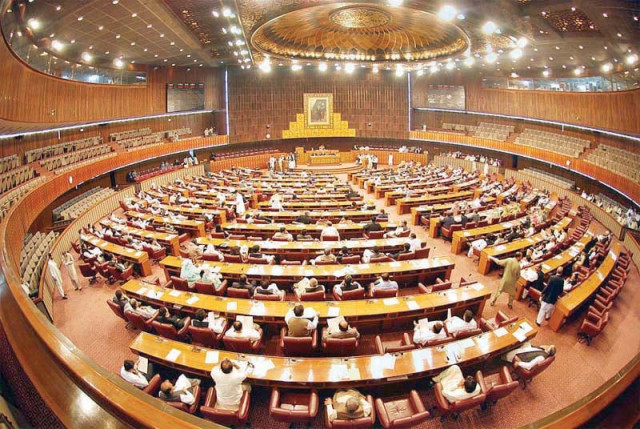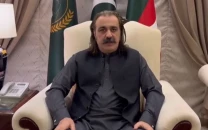Govt trying to keep additional taxes under Rs500b, NA panel told
SAPM on Finance Dr Waqar Masood says inflation to remain elevated during the next fiscal year

The government will try to impose less than Rs500 billion worth of additional taxes in the budget, while increase in the power tariffs has been deferred only for the time being, Special Assistant to Prime Minister on Revenue and Finance Dr Waqar Masood said on Thursday.
Dr Masood’s statement to the National Assembly Standing Committee on Finance marks a visible shift from the stance taken by Finance Minister Shaukat Tarin who has said that there would be no increase in taxes and the electricity tariff.
The government has disclosed next year’s economic growth target at 5.02% and inflation target at 8.2%—the two key goals that the members of the committee doubted very much. Public debt has been projected to grow to Rs44.2 trillion—an addition of Rs4 trillion in next fiscal.
“We are trying that less than Rs500 billion worth of additional taxes should be imposed, including recently introduced corporate income tax measures [of Rs81 billion],” Masood said, adding that the next budget will be presented in the light of an understanding with the International Monetary Fund (IMF).
According to the prime minister’s special assistant, the government will reach a consensus with the IMF before the budget and only those proposals will be taken to parliament that would have been agreed with the IMF.
“The IMF wants Rs5.963 trillion tax collection target and we will take some taxation measures to try to reach the tax target in addition to autonomous growth in revenues,” Masood said, adding that the talks with the IMF were going on and final tax and additional revenue measures will be decided in consultation with the global lender.
Read more: No tax increase for salaried class in budget, says Tarin
The tax revenues cannot be increased by 25% in the next fiscal year, which will make the budget deficit and public debt projections unrealistic, Dr Ayesha Pasha of the Pakistan Muslim League-Nawaz (PML-N) pointed out.
Dr Masood replied that the IMF had agreed that it would not push Pakistan to impose taxes on goods that may lead to food inflation. He added that the IMF had asked that the government should not “abandon the fiscal discipline path to which we have agreed”.
“You claim that there will be no increase in electricity prices in the next fiscal year but I challenge you that prices will go up,” Naveed Qamar of the Pakistan Peoples Party (PPP) said.
Dr Masood clarified that Finance Minister Shaukat Tarin did not say that the electricity prices would not be increased rather he stated that the increase had only been deferred at this stage.
Inflation
During the meeting, chaired by its Chairman Faizullah Kamoka, the committee members, including those belonging to the ruling Pakistan Tehreek-e-Insaf (PTI), were sceptical about the credibility of the macroeconomic framework, particularly the 8.2% inflation, and Rs5.8 trillion collection target for the Federal Board of Revenue (FBR).
The economic adviser of the finance ministry claimed that the commodity prices, exchange rate, food supplies and utility prices would remain stable in the next fiscal year, which would help contain inflation rate to 8.2%.
However, the Kamoka, who also belongs to the PTI, said that reduction in inflation rate from this year’s 9% to 8.2% in the next year was not an improvement at all. “For this fiscal year, the inflation projection was 6.5%, which has now been revised to 9%, then what is the guarantee that the 8.2% inflation rate will be achieved in the next fiscal year,” he asked.
“If the international prices do not stabilise, there will also be pressure on domestic prices in the next fiscal year,” Dr Masood replied. He said that the exchange rate was also slightly under pressure and the open market rate was at around Rs155 to a dollar.
Committee member Ali Pervez questioned the government’s taxation policies that were causing an increase in the share of indirect taxes, which hurt the poor more than the rich. Dr Masood replied that the taxation measures would not impact the prices.
Sadaqat Abbasi, of the PTI, said that the biggest “failure of our policymakers” is that the inflation rate jumped to 9% as against the target of 6.5%. Hina Rabbani Khar of the PPP quipped that the numbers and objectives were unchanged since 2004, when Dr Waqar Masood became the secretary.
Former planning minister Ahsan Iqbal, of the PML-N, questioned whether the policies of the previous PML-N government were wrong and that the economic growth was artificial. Dr Masood, who was the finance secretary during the PML-N government, and a proponent of strong rupee, replied that the PML-N left behind the highest ever current account deficit.
To another question, Dr Masood said that it could be debated whether the PTI government devalued the currency more than the requirement and set very high interest rates but the direction was right.
Budget
The austerity policy of the current government would continue in the next fiscal year but its pace would be slow, Dr Massod told the committee members, sharing figures with the members, showing that the total size of the federal budget was projected at Rs8.45 trillion—up Rs1.16 trillion or 16%.
The government has proposed Rs7.9 trillion gross revenue target for the next fiscal year—up by Rs1.5 trillion or 23.4% over this year revised estimates. The share of the provinces has been estimated at Rs3.42 trillion—also higher by Rs710 billion or 26%, the figures show.
The net federal receipts are estimated at Rs4.5 trillion—up from Rs3.7 trillion, showing an increase of 21% over this year’s estimates. The current expenditures are estimated at Rs7.6 trillion—up by Rs922 billion or 14% over this year.
Read: Govt to increase PSDP to Rs900 billion in upcoming budget
The PSDP has been projected at Rs900 billion—up by Rs250 billion or 38.4%. The budget deficit is projected at Rs3.97 trillion—up by Rs375 billion or 10.4%. In terms of GDP, the federal budget deficit will be 7.3% —almost at this year’s level.
The government has projected primary budget deficit of Rs901 billion or equal to 1.7% of the GDP. The overall deficit is projected at Rs3.4 trillion or 6.3% of the GDP on the back of Rs570 billion savings by the provinces, which Dr Pasha termed unrealistic.
The overall primary balance is shown at Rs331 billion due to provincial savings. The projections showed that the total public debt will be 81.4% of the GDP or Rs44.2 trillion by the end of next fiscal year. For this fiscal year, the debt has been projected at 84.2% of the GDP or Rs40.2 trillion.
The budget deficit has been projected at 6.3% of the GDP—also slightly higher than endorsed by the cabinet. The primary balance has been projected at 0.6% in the next fiscal year, showing a more deficit of Rs271 billion than what had been approved by the cabinet for the next fiscal year.
The public debt would increase because of the budget deficit and the current account deficit will widen due to an expansion in the economy, outgoing Finance Secretary Kamran Ali Afzal said.
The current account deficit has been projected at $4.8 billion in the next fiscal year as against $1 billion deficit in this fiscal year.



















COMMENTS
Comments are moderated and generally will be posted if they are on-topic and not abusive.
For more information, please see our Comments FAQ